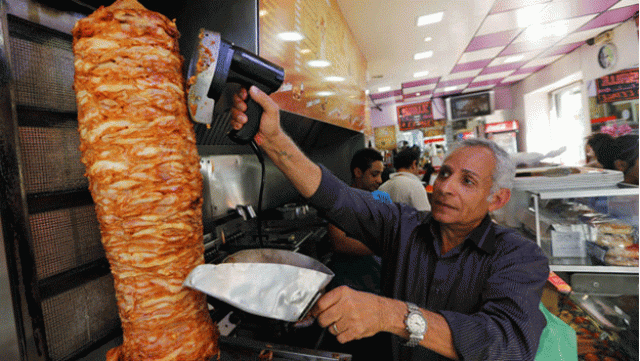Spain proposes new 'kebab law'
The laws proposes to put conditions on commercial licenses for Kebab shops in Spain

PHOTO: REUTERS
Ruling conservatives, who are seeking reelection in a May 24 municipal vote, hope to limit the number of kebab shops and other traditionally immigrant-owned businesses in Tarragona's historic quarter.
Benzawi, 52 years old, is married to a Spaniard, and holds dual nationality. He immigrated to Spain twenty years ago. He and his wife have been running a Kebab shop and halal grocery store for seven years in Tarragona.
A head of the Tarragona branch of Spain's ruling Popular Party, Alejandro Fernandez said the changes would prevent immigrant "ghettos" and protect "traditional Spanish businesses"
"My tomatoes are Spanish, and so are the potatoes I sell," Benzawi said one evening while closing up his shop for the night."Please explain this to me!" he implored. "Do I need to sell pork to be a 'traditional Spanish business'? Do I need to sell wine?"
READ: Nutella bans 'Muslim' from custom-label jars in France
The propsed law sets condition for new businesses. The law says no commercial licenses will be granted to any new kebab shops, dollar stores on Internet cafes unless they are located more than 500 yards from existing ones. The businesses would have to comply with new hygiene standards and closing hours. The law did not propose closing of any existing businesses.
The proposal still had Benzawi really flustered. “My business is legal!" said Benzawi,"I pay my taxes. I don't sell contraband. So what are they so worried about? This is called discrimination."
Majority of Spain's estimated 1.6 million Muslims are first-generation immigrants from countries, Morocco, Tunisia, and Algeria though a growing number are from Pakistan and Senegal. Muslim leaders of the community complain that they have been disproportionately affected by the country's economic crisis.
While Fernandez, the man behind the so-called Kebab law, declined to comment a fellow party member said: “Our coastal region has always had the most immigration, and we've never had any problems," said Joaquim Enrech Garola, the Reus town councilor for citizens' security. "In recent years, more Muslims have arrived. Now, for example, let's say a bunch of Muslim kids are milling around after school. It's better if we disperse them, because they could form a ghetto. What we're doing is in their interest and in ours."
Although Muslims account for about 3% of Spain's population, they make up nearly 10% of the people in the coastal Catalan provinces of Tarragona and neighboring Barcelona — the highest proportion in mainland Spain and roughly the same or higher than the averages in France, Germany or Britain.
READ: Student dressed as Muslim cleric receives abuse on streets of Milan
Burqas were banned in Reus last year, but the town responded by taking the term ' burqa' out of the law.
"It's not to stop the Muslim burqa or niqab," he said in an interview at the Reus town hall. "It also applies to people wearing motorcycle helmets while walking down the street. It's not religious."
Most interviewed residents in the city's historic quarter were unaware of the proposed limits on the kebab shops and many responded with concern about their favorite late-night joints. At the Tarragona Islamic Center, worshipers discussed the proposals at length before Friday prayers.
"It's election season. We're used to this. They think it'll win them votes," the center's imam, Muhammed Abdul-Rahim Bokadira, said in an interview before leading hundreds in prayer in a poorly lighted space that used to house a municipal market.
Spain also announced earlier this year that it was investigating hundreds of Muslim-owned businesses on allegations that they funneled money to IS
"Whenever there's a crisis," Tarkou said, "they always blame the weakest ones — the immigrants."
The article originally appeared on Los Angles Times



















COMMENTS
Comments are moderated and generally will be posted if they are on-topic and not abusive.
For more information, please see our Comments FAQ